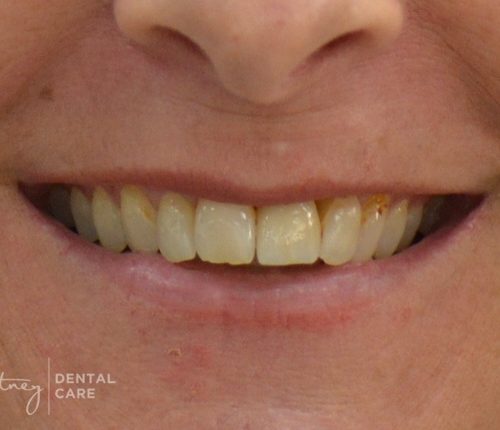How to Stop Wisdom Teeth Pain

The sensation of our last teeth breaking through the gums can be a surprise to many as not everyone has wisdom teeth. However, this dental surprise may also be painful, especially when they come in at odd angles or crowd the jaw.
Fortunately, there are treatments available to stop wisdom teeth pain in its tracks. From simple home remedies to wisdom tooth removal, this guide will walk you through everything you need to know about providing your aching gums with lasting relief.
What are Wisdom Teeth?
Wisdom teeth are the final four teeth that emerge from the far back area of our gums, one in each corner of the jaw. They generally emerge during adulthood, although not everyone is guaranteed to have been born with a set of wisdom teeth, or have them emerge from the gums.
At What Age Do Wisdom Teeth Come in?
You are most likely to see these molars emerge from the ages of 17-25, but some people may not grow them until later in life. There is no issue if you do not develop wisdom teeth at any point as they are not necessary for our overall oral health or function.
Causes of Wisdom Teeth Pain
Wisdom teeth pain is often a sign that your jaw does not have space for its newly-emerged molars. Human jaws have shrunk over time, leaving only enough room for 28 teeth to fit comfortably, rather than the full 32. The lack of room causes the new wisdom teeth to press against other teeth, causing pain and discomfort.
This inability of wisdom teeth to completely emerge into the mouth is commonly referred to as impacted wisdom teeth, with nearly 90% of people having at least one impacted wisdom tooth. Impacted teeth not only causes varying degrees of pain but can also lead to more serious dental issues, such as:
- Growth of bad bacteria, leading to gum disease
- Infections
- Jaw pain
- Mouth ulcers
- Cavities
Partially emerged wisdom teeth, which have been stuck in the gums or emerged at the wrong angles, may also cause pain due to irritating the gums, leading to potential inflammation. It is also difficult to keep such teeth clean, which can cause the tooth to decay and develop into a toothache.

How Long Will Wisdom Teeth Pain Last?
Generally, a wisdom tooth takes a year, or even several years, to completely emerge. It is not uncommon to experience discomfort or growing pains occasionally during this time, but particularly painful bouts should only last around a week or so.
If you are experiencing continuous or extreme amounts of wisdom tooth pain, then there may be an issue with how your teeth are emerging.
Symptoms Associated with Wisdom Teeth Pain
With wisdom tooth pain may come other symptoms that indicate that your molars are not growing correctly, or that there is not enough room for them to develop. Not everyone will experience similar symptoms, but the most common ones are:
- Bad breath
- Difficulty in chewing or opening the mouth
- Swelling or stiffness in the jaw
- Jaw pain
- Tender, bleeding, or swollen gums
- Sinus pain
Wisdom Teeth Pain Treatments
If you are experiencing painful wisdom teeth simply due to their growth, you can treat the bout of temporary pain by taking medication with pain relief and anti-inflammatory properties. However, cases of impacted wisdom teeth usually require surgical intervention to prevent further damage from occurring to the surrounding teeth and to relieve wisdom tooth pain altogether. This is generally done as a wisdom teeth removal procedure.
You can always discuss with your dentist about what kind of treatment plan is required for your teeth.
Home Remedies for Wisdom Teeth Pain
There are multiple different home remedies available to try out even before getting your wisdom teeth removed. While these methods may relieve dental pain, even if just temporarily, they will not be able to directly address the cause of this pain. Only professional care offered by dentists can accurately diagnose and fix the problem of impacted wisdom teeth.
Ibuprofen
This over-the-counter medication is a pain reliever that also reduces inflammation, allowing for any swelling of the affected gums to subside. This is generally just a form of temporary pain relief, however, until proper medical treatments can be provided.
Numbing Gel
The numbing effect of dental gels can relieve pain associated with emerging or impacted wisdom teeth. The gels are available over the counter and can be directly applied to your gums throughout the day as needed.
Saltwater Rinse
Using a cup of warm water mixed with a teaspoon of salt, you can relieve wisdom tooth pain by holding the mixture in your mouth for a minute or two. This should be repeated around four times a day to keep the impacted tooth clear of possible infections and its pain soothed.
Ice Pack
Applying an ice pack or small bag of ice to the impacted wisdom tooth for 15-20 minutes every few hours can relieve dental pain. It will also reduce the swelling around the affected tooth.
Clove Oil/Buds
The eugenol found in cloves can act as both a numbing agent and an anti-inflammatory, making it an excellent choice to alleviate wisdom tooth pain. Just add a little bit of clove oil to a cotton bud and allow it to sit on the affected site for 5-15 minutes, or crush a clove bud and tuck it into place for the same amount of time. Repeat as needed throughout the day.
Tumeric
You can try rubbing loose turmeric on the affected gums or making a paste out of baking powder, toothpaste, and turmeric, to relieve pain and reduce swelling. Just be sure to rinse out the mixtures after a few minutes of application.
Essential Oil and Vanilla Extract Rinse
Mix a cup of warm water with a few drops of vanilla extract and select essential oils to create a mouth rinse that will soothe your wisdom teeth pain. The best essential oils to use are myrrh, peppermint, tea tree, lemon, Roman chamomile, thyme, and coconut oil. You should swish this mixture around your mouth for a minute before spitting it out.
Onion
Onions have both antimicrobial and anti-inflammatory properties, making them a useful tool to fight bacterial infections and reduce swelling around the wisdom teeth area. Just chewing a piece of onion on the side of your mouth that has pain for a few minutes can provide pain relief.
Teabags
The ingredient tannins found in teabags have both anti-inflammatory and antibacterial properties, preventing bacterial infections even as it reduces swelling. After boiling a plain cup of tea, place the cup with the teabag still in it into the fridge. Once the tea is cold, remove the teabag and place it against the area with the most pain.
Wisdom Teeth Removal
When home remedies are not completely alleviating the pain of wisdom teeth development, or if there are issues with how the tooth is emerging from the gums, wisdom teeth removal may be the only means of addressing this issue.
After your dentist has thoroughly examined your teeth, including a full mouth x-ray, they can determine if your oral health will improve once your wisdom teeth are removed. This is usually the case if there is not enough room in your mouth for the emerging teeth and there may be issues with the existing teeth being moved around.
A wisdom tooth removal procedure is a kind of dental surgery, meaning that a local anaesthetic is used to numb the affected area before the process begins. The dentist will then proceed with the surgery, which usually only takes 10-20 minutes to complete:
- The wisdom tooth to be removed is loosened from its socket by the dentist applying pressure.
- Small cuts are made around the tooth to expose its entirety so any blockages to the roots can be cleared.
- Either the entire wisdom tooth is removed in one go, or it may be cut up into smaller pieces for easier removal.
- The area is cleaned and then sealed with stitches. Then a gauze is placed over the top to stop any bleeding and help the blood clot form.
You may experience some lingering pain for a few days after the procedure, with the maximum length of time generally being two weeks. This pain can be alleviated through pain medication, icing the affected spot, and keeping the surgery site clean with a saltwater rinse.
Wisdom Teeth Pain Prevention
The positioning of wisdom teeth at the far back of your mouth, as well as their slow emergence from the gums, can sometimes make it difficult to keep them clean. However, you are less likely to experience wisdom teeth pain or risk your gum health so long as you are practising good oral hygiene and undergoing regular professional preventative care.
The best prevention methods for wisdom teeth pain, and avoiding wisdom teeth removal for damaged molars, include:
- Brushing teeth twice a day alongside flossing
- Using anti-bacterial mouthwash to reduce the buildup of bad bacteria
- Drinking plenty of water to flush out food debris and bacteria from the teeth and gums
- Avoiding sugary foods that encourage the growth of bacteria when caught between teeth
How Do You Know if Wisdom Tooth Pain is Serious?
While the pain you are experiencing may just be from your new tooth pushing out from your gums, it may also be an indication of a more serious issue to come. In some cases, impacted wisdom teeth cause your mouth to be at a higher risk for infections, damaged teeth, or other dental problems.
Your wisdom tooth pain may be an indication of something more serious if it is accompanied by other symptoms or signs like:
- Overly painful gums
- Red, inflamed, swollen, or bleeding gums
- A swollen and/or sore jaw
- Bad breath
- Difficulty opening your mouth or chewing
- Cysts have formed around your wisdom tooth
- An unpleasant taste in your mouth
- Sinus pain, congestion or headaches
- Earaches
- Pain in your neck and/or head
Should I Go to the Dentist for Wisdom Tooth Pain?
If the pain of your emerging wisdom teeth is becoming a constant source of discomfort, or you notice any additional symptoms that are causing you pain or worry, it may be time to see a professional for help.
The well-being of your adult teeth is important to maintain, and sometimes that means undergoing a wisdom tooth removal procedure when preventative measures are no longer working. Fortunately, the team at Putney Dental Care are experienced in wisdom teeth removal and ready to provide you with the pain relief you have been searching for.
Your appointment is just a call away at (02) 9808 2588, or you can book online to set up your initial consultation.
FAQs
What Happens if You Ignore Wisdom Teeth Pain?
Unfortunately, wisdom teeth pain is not likely to go away on its own, even if you do your best to ignore it. Most cases of pain are an indication that one or more of your four wisdom teeth are impacted and may be causing damage to the surrounding teeth. Fluid-filled cysts may form around the wisdom teeth if this issue is ignored, leading to the hollowing of your jaw bone, or an infection that can spread from your bloodstream throughout your body.
The pain itself may also disrupt your daily dental brushing and cleaning routine, which can lead to gum disease, tooth decay, and other infections.
How Do You Stop Wisdom Teeth from Hurting Overnight?
For overnight wisdom teeth pain relief, you can try several methods, including: taking an over-the-counter pain reliever, using a cold compress on the affected site, eating only soft foods, or rinsing your mouth with warm water and salt.
What’s the Difference Between a Dental Bridge & Implant 3 Stages of Recovering from Dental ImplantsLatest from the Dental Blog
 14 Feb 2018
14 Feb 2018
How to Use Dental Floss with Braces
Daily flossing should be a part of your oral hygiene routine. Dental floss helps remove particles and plaque in the…
 08 Nov 2017
08 Nov 2017
Importance of Dental Checkups: Why Regular Care is the Best Care
There are lots of things that can cause problems with your mouth, and some of them are easier to miss…
 10 Nov 2017
10 Nov 2017
Impacts of Stress on your Dental Health
With the end of the year fast approaching, a busy and stressful time can be expected for some people. An…
